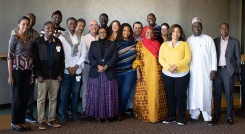Clonal hematopoiesis and inherited genetic variation in sickle cell disease
Sickle cell disease (SCD) is marked by chronic hemolysis, systemic endothelial dysfunction, inflammation, and vascular occlusion, leading to severe pain, multi-organ damage, and a median lifespan of 48 years in high-income countries. Young adults with progressive heart, lung, or kidney damage are at heightened risk for premature death.
Stroke Prevention in Nigeria: SPRING 2
Posted in
In 2020, the SPRING research team completed a multicenter phase III randomized controlled trial fo
Vanderbilt Institute for Research Development and Ethics (VIRDE)
Posted in
VIRDE is an annual intensive research training program designed to facilitate trainee research productivity in low- and middle-income countries (LMICs). This month-long program is intended to bolster and further develop the skill sets necessary for conducting responsible human subjects’ research and developing a grant proposal for submission. Attendees participate in a series of grant writing, research ethics/scientific integrity, and career development seminars and workshops.
Clinical and genetic risk factors associated with adverse long-term health outcomes after curative therapies in individuals with sickle cell disease
Posted in
The primary objective is to implement a personalized approach to curative therapies for children and adults with sickle cell disease (SCD) to maximize benefits while minimizing adverse outcomes. Current efforts to understand long-term health outcomes after these therapies are limited. The focus on initial treatment success recalls developments in pediatric oncology during the 1980s, where effective therapies eventually led to increased risks of organ dysfunction and malignancies.
